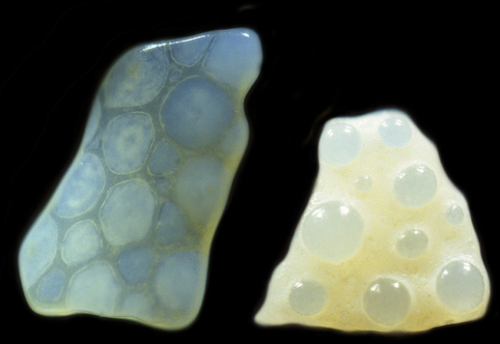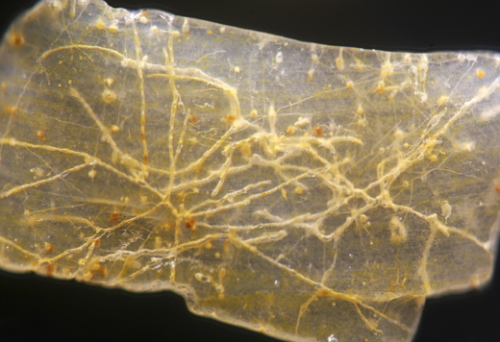- 近期网站停站换新具体说明
- 按以上说明时间,延期一周至网站时间26-27左右。具体实施前两天会在此提前通知具体实施时间
主题:【原创】一沙一世界 -- 任爱杰
诗贵在意境而不在长短。很多名句的出处诗如果整体来看并不怎样,只有一两句的亮点。这一点,不少朋友都已经说过了。例如虎兄的大作履虎尾:【原创】掬水月在手(下)就说到了这个问题。
这个问题是普遍性的。不但中国诗有此问题,外国诗也有这个问题。例如威廉·布莱克(William Blake)的长诗 Auguries of Innocence 。
这个题目一般译作 《天真的预兆》,其实从诗的内容来看应当译为《纯真的卜辞》更为贴切。
从整体来说,这首诗其实是首又臭又长的二流讽刺诗。下面是诗的全文,大家有兴趣的可以慢慢读:
And a heaven in a wild flower,
Hold infinity in the palm of your hand,
And eternity in an hour.
A robin redbreast in a cage
Puts all heaven in a rage.
A dove-house fill'd with doves and pigeons
Shudders hell thro' all its regions.
A dog starv'd at his master's gate
Predicts the ruin of the state.
A horse misused upon the road
Calls to heaven for human blood.
Each outcry of the hunted hare
A fibre from the brain does tear.
A skylark wounded in the wing,
A cherubim does cease to sing.
The game-cock clipt and arm'd for fight
Does the rising sun affright.
Every wolf's and lion's howl
Raises from hell a human soul.
The wild deer, wand'ring here and there,
Keeps the human soul from care.
The lamb misus'd breeds public strife,
And yet forgives the butcher's knife.
The bat that flits at close of eve
Has left the brain that won't believe.
The owl that calls upon the night
Speaks the unbeliever's fright.
He who shall hurt the little wren
Shall never be belov'd by men.
He who the ox to wrath has mov'd
Shall never be by woman lov'd.
The wanton boy that kills the fly
Shall feel the spider's enmity.
He who torments the chafer's sprite
Weaves a bower in endless night.
The caterpillar on the leaf
Repeats to thee thy mother's grief.
Kill not the moth nor butterfly,
For the last judgement draweth nigh.
He who shall train the horse to war
Shall never pass the polar bar.
The beggar's dog and widow's cat,
Feed them and thou wilt grow fat.
The gnat that sings his summer's song
Poison gets from slander's tongue.
The poison of the snake and newt
Is the sweat of envy's foot.
The poison of the honey bee
Is the artist's jealousy.
The prince's robes and beggar's rags
Are toadstools on the miser's bags.
A truth that's told with bad intent
Beats all the lies you can invent.
It is right it should be so;
Man was made for joy and woe;
And when this we rightly know,
Thro' the world we safely go.
Joy and woe are woven fine,
A clothing for the soul divine.
Under every grief and pine
Runs a joy with silken twine.
The babe is more than swaddling bands;
Every farmer understands.
Every tear from every eye
Becomes a babe in eternity;
This is caught by females bright,
And return'd to its own delight.
The bleat, the bark, bellow, and roar,
Are waves that beat on heaven's shore.
The babe that weeps the rod beneath
Writes revenge in realms of death.
The beggar's rags, fluttering in air,
Does to rags the heavens tear.
The soldier, arm'd with sword and gun,
Palsied strikes the summer's sun.
The poor man's farthing is worth more
Than all the gold on Afric's shore.
One mite wrung from the lab'rer's hands
Shall buy and sell the miser's lands;
Or, if protected from on high,
Does that whole nation sell and buy.
He who mocks the infant's faith
Shall be mock'd in age and death.
He who shall teach the child to doubt
The rotting grave shall ne'er get out.
He who respects the infant's faith
Triumphs over hell and death.
The child's toys and the old man's reasons
Are the fruits of the two seasons.
The questioner, who sits so sly,
Shall never know how to reply.
He who replies to words of doubt
Doth put the light of knowledge out.
The strongest poison ever known
Came from Caesar's laurel crown.
Nought can deform the human race
Like to the armour's iron brace.
When gold and gems adorn the plow,
To peaceful arts shall envy bow.
A riddle, or the cricket's cry,
Is to doubt a fit reply.
The emmet's inch and eagle's mile
Make lame philosophy to smile.
He who doubts from what he sees
Will ne'er believe, do what you please.
If the sun and moon should doubt,
They'd immediately go out.
To be in a passion you good may do,
But no good if a passion is in you.
The whore and gambler, by the state
Licensed, build that nation's fate.
The harlot's cry from street to street
Shall weave old England's winding-sheet.
The winner's shout, the loser's curse,
Dance before dead England's hearse.
Every night and every morn
Some to misery are born,
Every morn and every night
Some are born to sweet delight.
Some are born to sweet delight,
Some are born to endless night.
We are led to believe a lie
When we see not thro' the eye,
Which was born in a night to perish in a night,
When the soul slept in beams of light.
God appears, and God is light,
To those poor souls who dwell in night;
But does a human form display
To those who dwell in realms of day.
这首诗之所以出名,是因为其耐人寻味的前四句:
To see a world in a grain of sand,
And a heaven in a wild flower,
Hold infinity in the palm of your hand,
And eternity in an hour.
这开头四句,现在流行的翻译是这样的:
一沙一世界,
一花一天堂。
双手握无限,
刹那是永恒。
由于这几句单独来看大有禅意,于是有人就不断引伸,画蛇添足得搞成:
一沙一世界,
一花一天堂,
一树一菩提,
一叶一如来
每每看到,都让我忍俊不止。
正好在讨论哈姆雷特独白的时候“不打不相识”老兄,提起这四句,于是做一回佛门中人,作一偈如下:
且窥一沙一世界,
轻拈一花一天堂。
无穷无尽尽君掌,
永生永世永刹那。
当然新文艺腔的译法也是不错的:
看一粒沙中的世界,
和一朵野花上的天堂。
无尽的世界尽在你掌中,
所谓永远也不过一段时光。
当然,各位前辈高人的翻译比我的好多了,节录如下:
一颗沙里看出一个世界,
一朵野花里放进一座天堂,
把无限放在你的手掌上,
永恒在一刹那里收藏。
——梁宗岱 译
在一颗沙粒中见一个世界,
在一朵鲜花中见一片天空,
在你的掌心里把握无限,
在一个钟点里把握无穷。
——张炽恒 译
从一粒沙看世界,
从一朵花看天堂,
把永恒纳进一个时辰,
把无限握在自己手心。
——王佐良 译
一花一世界,一沙一天国,
君掌盛无边,刹那含永劫。
——宗白华 译
一沙一世界,一花一天堂。
无限掌中置,刹那成永恒。
——徐志摩 译
各类翻译中,我认为张炽恒的最贴近原味。宗、徐两人都没译出那个“To See”来。
本帖一共被 1 帖 引用 (帖内工具实现)
此案甚趣,忍不住说两句。
和一朵野花上的天堂。
无尽的世界尽在你掌中,
所谓永远也不过一段时光。
商榷一下这个翻译(任兄,我说这个不是因为你指出我翻译上的不确,那个你讲得确实对,我这不是报复你哦:-))
首先,这里“世界“前有个定语:“一粒沙中的“,也就是说这个世界就只是一粒沙中的世界,限定性的意味较强,跳脱的意味不够,而有些别的翻译跳脱的意味更浓一些。
其次,“所谓永远也不过一段时光“这句话的语气不妙,有点讽刺/轻蔑的意味,不够正面。而此诗的氛围是很正面的。“永恒不过是刹那“和“刹那是永恒“,意味是不同的。
最后,我想提一下欣赏诗歌的角度,许多朋友欣赏诗歌仅仅局限在对佳句的欣赏,这其实是一种初步的欣赏,比如说〈离骚〉和绝大多数陶诗都没有什么特别的佳句,但是离骚和陶诗在中国诗歌文学史上的地位是无与伦比的。而反观〈掬水月在手〉一诗,文字上确实有些聪明,但是境界其实是很低的。至于这首英文诗整体上如何,我没有研究过,不谈。
如何欣赏诗歌是个大题目,值得多讨论。
当然,如果只读头四句,还是可以说有“禅趣”。但越往后读,其实讽刺、悲观的意味就越大了。随便摘一段:
A horse misused upon the road
Calls to heaven for human blood.
Each outcry of the hunted hare
A fibre from the brain does tear.
这无论如何都说不上是正面吧?所以译为“所谓永远也不过一段时光”正是呼应后文。
我也赞成读诗要从整体上来看。这也是为什么我对此诗的整体评价不高。
然而开头四句如果单独出来也的确是佳句。佳句而不念整诗的,甚至整诗因一二佳句才得以流传的数不胜数。
举例来说“身无彩凤双飞翼,心有灵犀一点通”人人都知道,意境难道不佳?前面首句“昨夜星辰昨夜风”也算家喻户晓。然而“画楼西畔桂堂东”可就没多少人知道。“隔座送钩春酒暖,分曹射覆蜡灯红。”香艳是香艳了,知道的人可就更少了。至于李商隐的自悲自叹“嗟余听鼓应官去,走马兰台类转蓬。”根本没人在乎。
屈原也好、陶渊明的诗也好,名句也是大大的有。没有“长太息以掩涕兮,哀民生之多艰。”屈原不过万千失意政客中的一个。没有“采菊东篱下,悠然见南山”谁又知道陶渊明?
读诗固然要看整体。但佳句就好比一美遮百丑,便有一点闪光也是要肯定的。
谁去读那整个全诗啊?
如果你欣赏离骚只是或主要是因为“长太息以掩涕兮,哀民生之多艰。“,那完全是不得要领,因为且不谈此句的真正意思是否是你的理解,就只说离骚的主旨和此句你理解的意思是不相干的。我想我是能猜出你是怎么理解评价此句的。离骚的价值不在于此。
“采菊东篱下,悠然见南山“固然好,但陶渊明的名头可不是这一句得来的,而是说,任兄你知道陶渊明是因为有此句诗而已。
现在只读头四句的也是您?莫非您知道 William Blake 只因为这四句?
顺便说一句,我首句的翻译是根据英文来的。
英文说“To see a world in a grain of sand”不是“from”也不是“through”,所以这个限定是原作加上去的。
至于作者的原意,其实到不是他忽然禅心发现,而是这一段不过是在描写占卜的景象罢了。
翻译。
但是,这里我并非特别推崇这四句诗,佳句确实是佳句,说点貌似很深刻的话,这也算是诗的一种,但是仅仅这样是不够的。
我不是要否定佳句,那就是否定一个建筑的一砖一瓦,而是说,仅仅停留在佳句的层次是初步的文学欣赏。话说回来,欣赏诗歌达到什么层次,不是什么大不了的事情,我只是就事论事罢了。
你似乎不解我的point啊。即使你的限定是完全符合原意的,那又怎样呢,宗,徐的翻译跳脱了原诗,带给我们更高的艺术,我认为这是很好的事情。如果原诗有个好底子,但又不够完美,把它完美一下,我认为很好。
Did you see Bob in the office?
你打算翻成“你见过办公室里的Bob?“
更自然的是你在办公室里见到Bob了吗?
所以,To see a world in a grain of sand
至少可以翻成:要在一粒沙中看到一个世界,
稍微变化一点就是:要从一粒沙中看出一个世界,意思是很相近的。
化用别人的诗词意境甚至直接使用别人的词句,苏东坡干过,太祖也干过。大家都说好。这是因为他们并不是干的翻译的活。
做翻译可是要信达雅。随便来个“跳脱了原诗”或许你认为是“更高的艺术”。但从翻译的角度讲,理解出原著没有的意思,那叫做“郢书燕悦”,还可以原谅。故意加上原著没有的意思,那就是添油加醋了。
类似的,在佛经中有很多。
如《华严经》“一花一世界,一叶一如来”。又,根据佛经《梵网经》叙述,莲华台藏世界周围有千叶花瓣,一叶花瓣就是一个大千世界。”外链出处
“一沙一世界”,甚至可以在中国文学中找到原文——这里卖个关子。
“双手握无限,刹那是永恒”,关于大小、有限与无限之间,佛学里面很多。如须弥纳于芥子、“十方三世不离当下一念,无边刹海尽在些微尘中”,”等等,一抓一大把。
一般人只记得这四句,这首诗有这四句也够了。其它诗句,还真的没能留下什么印象。
虽然是误解,也是美丽的误解。
例如国人把休息室写成 Restroom.或者反过来,把 Restroom 译为休息室。
科学家和艺术家加里·格林柏用显微镜观察,发现沙粒也能展现出惊人的颜色、形状和纹理。他利用一个3D显微镜拍摄了众多来自世界各地的沙粒图片,并收录在他的书《一粒沙》中。







俺们搞理工的也一样,费了半天劲搭一楼,人说就厕所还能看。
搞什末药来的?没成,碰出个尾歌来。
也算喜剧。